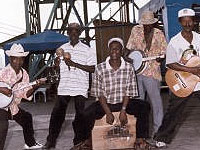Listening to Music from Across the Globe

What is the first thing that comes to mind when you think of “world music”? Pygmies in Africa pounding on animal skins? Mariachi bands during Cinco de Mayo? The background music at your favorite Indian restaurant?
You have probably heard global rhythms on main stream radio waves where Latin, African and Caribbean grooves frequently intertwine with pop vocals and heavy guitars. Artists from Madonna to the Black Eyed Peas to P.O.D. draw from a global spice cupboard to add flare to their music. This isn’t a new phenomenon; rock greats Paul Simon, Peter Gabriel, David Byrne and Sting have tapped global grooves and leading world musicians for their recordings for quite some time now.
Listening to music from other cultures and other continents serves to open one’s ears to new “flavors” of sound. The flavor metaphor works well as you can liken ethnic music to ethnic food with its variety of spices and variations. Also, like food, some global sounds grow on you quickly, while others are an acquired taste.
Why listen to music from other cultures?
First, God created all people in His image. God also blesses each person with a unique voice and with languages which can be used in song.
Second, music is used to communicate messages to an audience. These messages may address religion, family, community, politics, or any number of topics.
And last, by opening up our souls to the rich palette of global musical styles we also find ourselves open to the stories of people who live very different from us. And by opening our ears, we in turn open our eyes, hearts and minds to what is going on in the world around us.
Questions
World Music Listening PartyDraw from your own collection; check out music from the library; download MP3 files from the internet; purchase compilation CDs from your favorite local music shop, then:
Invite friends over and play a few of your favorite World Music tracks.
Ask your guests what they think of the music. If you get a positive reaction: play more in that genre. If you get a negative reaction: ask what they don't like about the sound.
When you get a chance, point out the many popular artists who draw from World Music influences: Paul Simon, Sting, Peter Gabriel, David Byrne and so on.
If your friends are still not impressed don't push the issue--try again at another time. If you friends enjoy the music, recommend CDs to them, loan them some of yours and turn them onto resources to learn more.
Tips:
1. Don't force your opinions and be respectful of others.
2. Be wary of too much of a good thing--don't overload your audience.
Add additional spice to your party by requesting that your guests bring food inspired by other cultures.
*This idea inspired by:
http://www.insideworldmusic.com/library/howto/htfriend.htm
Source
Getting Started On A World Music QuestI'd recommend a visit to the websites of some of the key world music labels:
* Putumayo World Music www.putumayo.com
* Real World www.realworld.co.uk
* Six Degrees www.sixdegreesrecords.com
* Luaka Bop www.luakabop.com
* Crammed Disc www.crammed.be
* Rough Guides www2.worldmusic.net
* Smithsonian Folkways www.folkways.si.edu
* Magnatune www.magnatune.com
Many of these sites have jukeboxes, radio stations or sample tracks (full or :30 samples). You can also find recordings from many of these labels at your favorite music store. I would use listening stations to sample various CDs.
World Music compilations can be a good place to sample different musical styles and see what you like. These releases are often compiled by geography. Many of the labels above have created compilations that you will find at local record and book stores or online. You can start your own World Music library by purchasing some sampler CDs that feature artists you like. Your local library is another place where you can sample world music. Once you have amassed some music you like host a World Music Listening Party.

